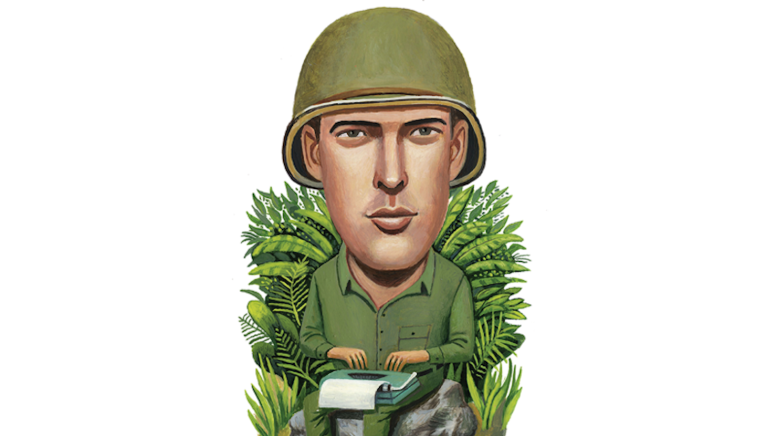“Nightmare of Fear”
At 26, Mecklin was a World War II correspondent for the Chicago Sun, accompanying Patton’s Third Army in France in 1944 when the German army captured and held him behind enemy lines for three days. He and four other POWs were allowed to escape by what Mecklin called “a tough young Nazi with a soft spot in his heart.” A year later a German soldier tapped him on the shoulder in a Berlin nightclub, saying, “You ought to remember me. I was your guard one afternoon.”
Around the World
After the war Mecklin reported from Rome, London, and New York. He was Time magazine’s Hong Kong correspondent covering the Indochina conflict and served as bureau chief in Ottawa, Beirut, Bonn, and San Francisco. He was on the board of editors at Fortune magazine when he died of cancer at 52.
“Dear Family”
Mecklin’s letters to his parents, sister Mary, and her husband, John Jenkins ’43, written almost monthly from around the world, are included in 11 boxes of his collected papers at Dartmouth. They offer his sophisticated perspective on world events sprinkled with witty accounts of the sometimes exasperating logistics of a family with two young sons living abroad and moving frequently.
Postgrad Education
Mecklin wrote home from Europe in 1945 that he didn’t learn about values at Dartmouth: “I didn’t understand freedom of speech, for instance, until I came over here and saw what happens when it doesn’t exist….I learned about economics in starving Berlin, not in Hanover. Perhaps it’s impossible to understand such things as a student, but I don’t think you have to be as dismally ignorant as I was.”
Lasting Tributes
Mecklin met alumni all over the world who remembered his father, beloved Dartmouth sociology prof John Moffat Mecklin, and recalled his class as the best they ever had. Father and son are honored by the Mecklin Prize in Sociology and the Mecklin Prize for best student writing in nonfiction or journalism.
Writing History
Mecklin was on assignment in Vietnam in 1954 when his friend, famed combat photographer Robert Capa, stepped on a land mine, becoming the first American correspondent killed there. Mecklin wrote movingly about that day in Life magazine and sent his parents a telegram: “Please don’t be alarmed….Need prolonged bath more than anything else.”
Arms and the Man
Mecklin wrote home from Beirut in 1956: “I’ve found to my surprise that being here has not changed any of my general attitudes, except to harden my opinion that it would be a great mistake for the U.S. to let itself get isolated on the side of Israel while Russia sides with the Arabs. That means most definitely, in my opinion, that we must not sell any more arms to the Israelis.”
Mission Impossible
From 1962 to 1964, Mecklin worked as the public affairs officer at the U.S. Embassy in Saigon. In his 1965 book, Mission in Torment: An Intimate Account of the U.S. Role in Vietnam, he wrote, “Events were to prove that the [U.S.] mission itself was unaware of how badly the war was going.” The book was banned in the U.S. Information Agency library in Saigon.





